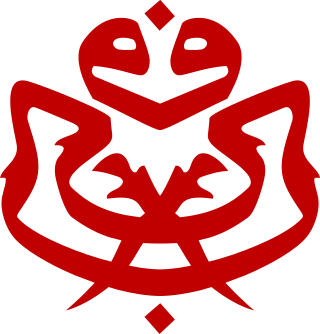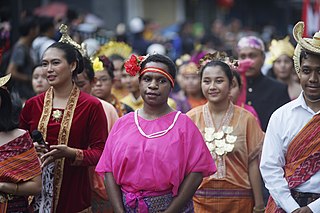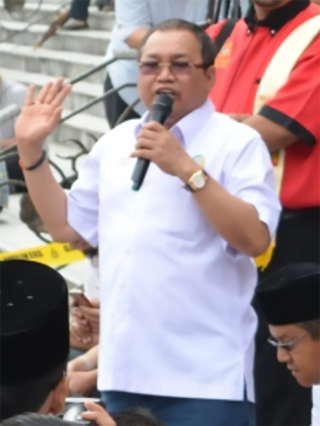Related Research Articles

The demographics of Malaysia are represented by the multiple ethnic groups that exist in the country. The official estimate of 2024 Malaysia's population is about 34,100,000 people. According to the 2020 census, is 32,447,385 including non-citizens, which makes it the 43rd most populated country in the world. Of these, 5.72 million live in East Malaysia and 22.5 million live in Peninsular Malaysia. The population distribution is uneven, with some 79% of its citizens concentrated in Peninsular Malaysia, which has an area of 131,598 square kilometres (50,810.27 sq mi), constituting under 40% of the total area of Malaysia.

The East Indies is a term used in historical narratives of the Age of Discovery. The Indies broadly referred to various lands in the East or the Eastern Hemisphere, particularly the islands and mainlands found in and around the Indian Ocean by Portuguese explorers, soon after the Cape Route was discovered. In a narrow sense, the term was used to refer to the Malay Archipelago, which today comprises the Philippine Archipelago, Indonesian Archipelago, Borneo, and New Guinea. Historically, the term was used in the Age of Discovery to refer to the coasts of the landmasses comprising the Indian subcontinent and the Indochinese Peninsula along with the Malay Archipelago.
Bumiputera or bumiputra is a term used in Malaysia to describe Malays, the Orang Asli of Peninsular Malaysia, and various indigenous peoples of East Malaysia. The term is sometimes controversial. It is used similarly in the Malay world, Indonesia, and Brunei.

The United Malays National Organisation (UMNO), officially Pertubuhan Kebangsaan Melayu Bersatu (PEKEMBAR), is a nationalist right-wing political party in Malaysia. As the oldest national political party within Malaysia, UMNO has been known as Malaysia's "Grand Old Party".

The Malay Dilemma is a 1970 book by Malaysian politician and writer Mahathir Mohamad, who went on to be the country's longest serving Prime Minister.
The New Economic Policy (NEP) was a social re-engineering and affirmative action program formulated by the National Operations Council (NOC) in the aftermath of the 13 May Incident in Malaysia. This policy was adopted in 1971 for a period of 20 years and it was succeeded by the National Development Policy (NDP) in 1991.

Orang Asli are a heterogeneous indigenous population forming a national minority in Malaysia. They are the oldest inhabitants of Peninsular Malaysia.
The indigenous peoples of Brunei are Bruneian people who belong to the ethnic groups considered indigenous to the country. It is more commonly attributed to indigenous people of the Malay race belonging to the seven ethnic groups, namely: Brunei, Tutong, Belait, Dusun, Murut, Kedayan and Bisaya. The local term rakyat jati refers to citizens of indigenous descent, in particular the aforementioned seven ethnic groups. The term bumiputera has also been sometimes used to refer to the indigenous peoples.

Ketuanan Melayu is a political concept that emphasises Malay power and preeminence in present-day Malaysia. The Malaysian Malays have claimed a special position and special rights owing to their longer history in the area and the fact that the present Malaysian state itself evolved from a Malay polity. The oldest political institution in Malaysia is the system of Malay rulers of the nine Malay states. The British colonial authorities transformed the system and turned it first into a system of indirect rule, then in 1948, using this culturally based institution, they incorporated the Malay monarchy into the blueprints for the independent Federation of Malaya.

Indonesians are citizens or people who are identified with the country of Indonesia, regardless of their ethnic or religious background. making it a multicultural archipelagic country with a diversity of languages, culture and religious beliefs. The population of Indonesia according to the 2020 national census was 270.2 million. 56% live on the island of Java, the world's most populous island. Around 95% of Indonesians are Native Indonesians, primarily of Austronesian and Melanesian descent, with 40% Javanese and 15% Sundanese forming the majority, while the other 5% are Indonesians with ancestry from foreign origin, such as Arab Indonesians, Chinese Indonesians, Indian Indonesians, and Indos.

Native Indonesians, also known as Pribumi or Bumiputra, are Indonesians whose ancestral roots lie mainly in the archipelago and consist of various ethnic groups, predominantly of Austronesian and Melanesian descent. In contrast are Indonesians of known (partial) foreign descent, like Chinese Indonesians, Arab Indonesians, Indian Indonesians, Japanese Indonesians, and Indo-Europeans (Eurasians).

Ibrahim bin Ali is a Malaysian politician. He is informally known as Tok Him. He served as the Member of Parliament (MP) for Pasir Mas from August 1986 to April 1995 and again from March 2008 to May 2013. He is a member of the Parti Bumiputera Perkasa Malaysia (PUTRA), a component party of the Gerakan Tanah Air (GTA) opposition coalition. He has served as the 1st and founding President of PUTRA since May 2019. He is also founding President of the Malay dominance organisation Pertubuhan Pribumi Perkasa (PERKASA).
Malaysia is a multi-ethnic country, with a predominantly Muslim population. Racial discrimination is embodied within the social and economic policies of the Malaysian government, favouring the Malays and in principle, the natives of Sabah and Sarawak. However, in practice, the natives of Sabah and Sarawak do not benefit much from these policies, with natives of Sabah and Sarawak composing the bulk of bottom 40% income cohort of Malaysia. Rather, it is the Malays that obtain heavily subsidised education in local universities and make up the bulk of these universities, including in terms of employment. The resources of Sarawak have been exploited for decades, with the Malaysian government enriching governmental officials and their associates. The concept of Ketuanan Melayu or Malay supremacy is accepted by the Malay-majority political sphere.

Malayness is the state of being Malay or of embodying Malay characteristics. This may include that which binds and distinguishes the Malay people and forms the basis of their unity and identity. People who call themselves Malay are found in many countries in Southeast Asia, united by a notional shared identity but divided by political boundaries, divergent histories, variant dialects and peculiarities of local experience. While the term 'Malay' is widely used and readily understood in the region, it remains open to varying interpretations due to its varied and fluid characteristics. 'Malay' as an identity, or nationality, is considered one of the most challenging and perplexing concepts in the multi-ethnic world of Southeast Asia.
Sarawak's population is very diverse, comprising many races and ethnic groups. Sarawak has more than 40 sub-ethnic groups, each with its own distinct language, culture and lifestyle. This makes Sarawak demography very distinct and unique compared to its Peninsular counterpart. However, it largely mirrors to other territories in Borneo – Sabah, Brunei and Kalimantan.

The Indonesian Malaysians are Malaysian citizens of Indonesian ancestry. Today, there are many Malaysian Malays who have lineage from the Indonesian archipelago and have played an important role in the history and contributed to the development of Malaysia, they have been assimilated with other Malay communities and are grouped as part of the foreign Malays or anak dagang in terms of race. The Malaysian census does not categorize ethnic groups from the Indonesian archipelago as a separate ethnic group, but rather as Malay or Bumiputera.

The Malaysian United Indigenous Party is a nationalist political party in Malaysia. The party was preceded by the United Indigenous Association of Malaysia and founded by members of the United Malays National Organisation (UMNO) rebel group Gabungan Ketua Cawangan Malaysia. It is a major component of the Perikatan Nasional coalition.

Sabah is the third most populous state in Malaysia, with a population of 3,418,785 according to the 2020 Malaysian census. It also has the highest non-citizen population, at 810,443. Although Malaysia is one of the least densely populated countries in Asia, Sabah is particularly sparsely populated. Most of the population is concentrated along coastal areas, with towns and urban centres seeing the most population growth.

Parti Bumiputera Perkasa Malaysia is a nationalist political party in Malaysia. The party was founded and led by Ibrahim Ali.
The Twelfth Malaysia Plan, otherwise known as the 12th Malaysia Plan and abbreviated as "12MP", is a comprehensive blueprint prepared by the Economic Planning Unit (EPU) of the Prime Minister's Department (PMO) and the Ministry of Finance. The blueprint is a continuation to the 11th Malaysia Plan with a clear strategic direction to allocate the national budget from 2021 to 2025 in regard to all economic sectors in Malaysia. The blueprint was tabled by Prime Minister Ismail Sabri Yaakob in Dewan Rakyat, Parliament on 27 September 2021.
References
- ↑ BBC News (2011-07-10): Malaysia’s ‘Ali Baba’ system causes ethnic tension by Jennifer Pak
- ↑ The Star (2007-03-22): Malaysia’s ‘Ali Baba’ entente under strain by Haroon Siddiqui, quoting R.S. Milne and Dianne Mauzy of the University of British Columbia in Malaysian Politics (Routledge, 1999)
- ↑ Ekonomi Indonesia, Sistem Ekonomi Ali Baba